2008年陕西省高考英语试题及详解
- 格式:doc
- 大小:232.00 KB
- 文档页数:20
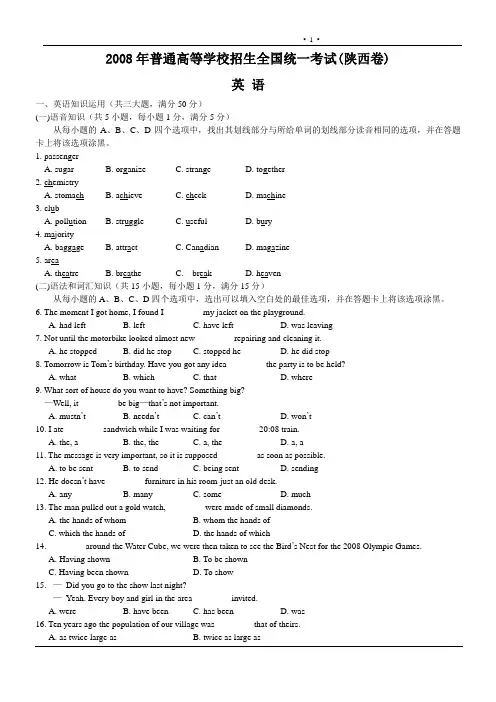
2008年普通高等学校招生全国统一考试(陕西卷)英语一、英语知识运用(共三大题,满分50分)(一)语音知识(共5小题,每小题1分,满分5分)从每小题的A、B、C、D四个选项中,找出其划线部分与所给单词的划线部分读音相同的选项,并在答题卡上将该选项涂黑。
1. passengerA. sugarB. organizeC. strangeD. together2. chemistryA. stomachB. achieveC. checkD. machine3. clubA. pollutionB. struggleC. usefulD. bury4. majorityA. baggageB. attractC. CanadianD. magazine5. areaA. theatreB. breatheC. breakD. heaven(二)语法和词汇知识(共15小题,每小题1分,满分15分)从每小题的A、B、C、D四个选项中,选出可以填入空白处的最佳选项,并在答题卡上将该选项涂黑。
6. The moment I got home, I found I ________ my jacket on the playground.A. had leftB. leftC. have leftD. was leaving7. Not until the motorbike looked almost new ________ repairing and cleaning it.A. he stoppedB. did he stopC. stopped heD. he did stop8. Tomorrow is Tom’s birthday. Have you got any idea ________ the party is to be held?A. whatB. whichC. thatD. where9. What sort of house do you want to have? Something big?—Well, it ________ be big—that’s not important.A. mustn’tB. needn’tC. can’tD. won’t10. I ate ________ sandwich while I was waiting for ________ 20:08 train.A. the, aB. the, theC. a, theD. a, a11. The message is very important, so it is supposed ________ as soon as possible.A. to be sentB. to sendC. being sentD. sending12. He doesn’t have ________ furniture in his room-just an old desk.A. anyB. manyC. someD. much13. The man pulled out a gold watch, ________ were made of small diamonds.A. the hands of whomB. whom the hands ofC. which the hands ofD. the hands of which14. ________ around the Water Cube, we were then taken to see the Bird’s Nest for the 2008 Olympic Games.A. Having shownB. To be shownC. Having been shownD. To show15. —Did you go to the show last night?—Yeah. Every boy and girl in the area ________ invited.A. wereB. have beenC. has beenD. was16. Ten years ago the population of our village was ________ that of theirs.A. as twice large asB. twice as large asC. twice as much asD. as twice much as17. Though we don’t know what discussed, yet we can feel the topic ________.A. had changed B will changeC. was changedD. has been changed18. —The floor is dirty. Can anyone clean it?—________ I do it all the time.A. Don’t mention it.B. Why you?C. Not sure.D. Not me again.19. Elizabeth has already achieved success ________ her wildest dreams.A. atB. beyondC. withinD. upon20. It’s going to rain. Xiao Feng, will you please help me ________ the clothes on the line?A. get offB. get backC. get inD. get on(三)完形填空(共20小题,每小题1.5分,满分30分)阅读下面短文,从短文后各题的A、B、C、D四个选项中,选出适合填入对应空白处的最佳选项,并在答题卡将该选项涂黑。
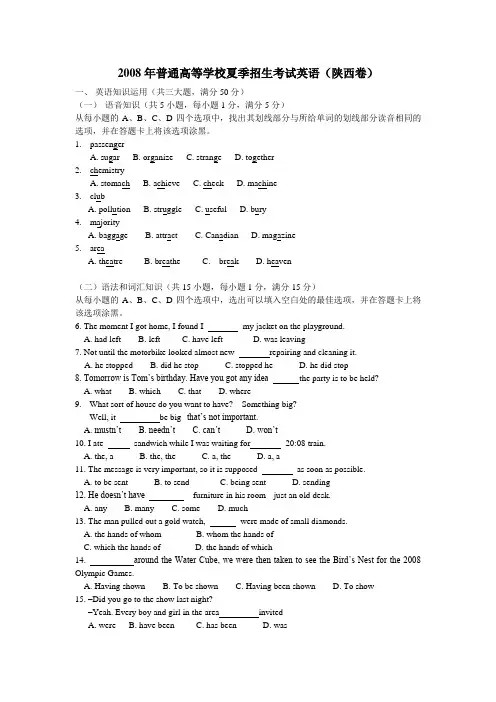
2008年普通高等学校夏季招生考试英语(陕西卷)一、英语知识运用(共三大题,满分50分)(一)语音知识(共5小题,每小题1分,满分5分)从每小题的A、B、C、D四个选项中,找出其划线部分与所给单词的划线部分读音相同的选项,并在答题卡上将该选项涂黑。
1.passengerA. sugarB. organizeC. strangeD. together2.chemistryA. stomachB. achieveC. checkD. machine3.clubA. pollutionB. struggleC. usefulD. bury4.majorityA. baggageB. attractC. CanadianD. magazine5.areaA. theatreB. breatheC. breakD. heaven(二)语法和词汇知识(共15小题,每小题1分,满分15分)从每小题的A、B、C、D四个选项中,选出可以填入空白处的最佳选项,并在答题卡上将该选项涂黑。
6. The moment I got home, I found I my jacket on the playground.A. had leftB. leftC. have leftD. was leaving7. Not until the motorbike looked almost new repairing and cleaning it.A. he stoppedB. did he stopC. stopped heD. he did stop8. Tomorrow is Tom’s birthday. Have you got any idea the party is to be held?A. whatB. whichC. thatD. where9. --What sort of house do you want to have? Something big?--Well, it be big--that’s not important.A. mustn’tB. needn’tC. can’tD. won’t10. I ate sandwich while I was waiting for 20:08 train.A. the, aB. the, theC. a, theD. a, a11. The message is very important, so it is supposed as soon as possible.A. to be sentB. to sendC. being sentD. sending12. He doesn’t have furniture in his room --just an old desk.A. anyB. manyC. someD. much13. The man pulled out a gold watch, were made of small diamonds.A. the hands of whomB. whom the hands ofC. which the hands ofD. the hands of which14. around the Water Cube, we were then taken to see the Bird’s Nest for the 2008 Olympic Games.A. Having shownB. To be shownC. Having been shownD. To show15. –Did you go to the show last night?–Yeah. Every boy and girl in the area invitedA. wereB. have beenC. has beenD. was16. Ten years ago the population of our village was that of theirs.A. as twice large asB. twice as large asC. twice as much asD. as twice much as17. Though we don’t know what discussed, yet we can feel the topic.A. had changedB. will changeC. was changedD. has been changed18. –The floor is dirty. Can anyone clean it?–I do it all the time.A. Don’t mention it.B. Why you?C. Not sure.D. Not me again.19. Elizabeth has already achieved success her wildest dreams.A. atB. beyondC. withinD. upon20. It’s goi ng to rain. Xiao Feng, Will you please help me the clothes on the line?A. get offB. get backC. get inD. get on(三)完形填空(共20小题,每小题1.5分,满分30分)阅读下面短文,从短文后各题的A、B、C、D四个选项中,选出适合填入对应空白处的最佳选项,并在答题卡上将该选项涂黑。
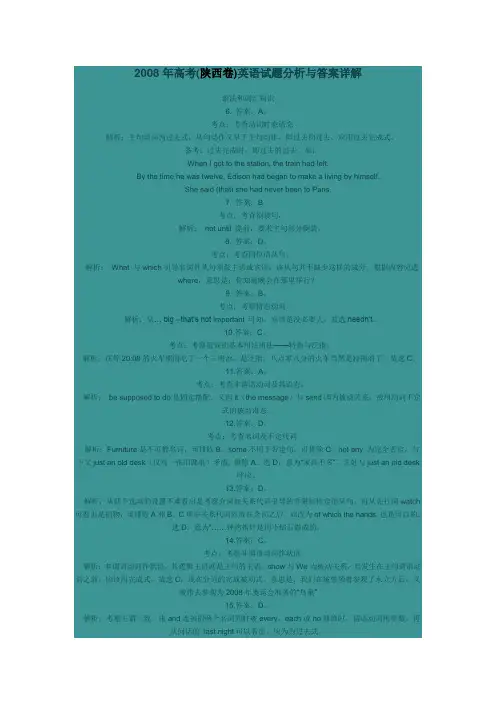
2008年高考(陕西卷)英语试题分析与答案详解语法和词汇知识6. 答案:A。
考点:考查动词时态语态解析:主句动词为过去式,从句动作又早于主句动作,即过去的过去,应用过去完成式。
备考:过去完成时,即过去的过去。
如:When I got to the station, the train had left.By the time he was twelve, Edison had began to make a living by himself.She said (that) she had never been to Paris.7. 答案:B。
考点:考查倒装句,解析:not until 提前,要求主句部分倒装。
8. 答案:D。
考点:考查同位语从句。
解析:What 与which引导名词性从句须做主语或宾语,该从句并不缺少这样的成分。
根据内容应选where,意思是:你知道晚会在那里举行?9. 答案:B。
考点:考察情态动词解析:从… big --that’s not i mportant 可知,应该是没必要大。
故选needn’t。
10.答案:C。
考点:考察冠词的基本用法用法——特指与泛指。
解析:在等20:08的火车期间吃了一个三明治,是泛指,八点零八分的火车当然是特指的了。
故选C。
11.答案:A。
考点:考查非谓语动词及其语态。
解析:be supposed to do是固定搭配。
又因it(the message)与send因为被动关系,故用动词不定式的被动语态。
12.答案:D。
考点:考查名词及不定代词解析:Furniture是不可数名词,可排除B。
some不用于否定句,可排除C。
not any 为完全否定,与下文just an old desk(仅有一张旧课桌)矛盾, 排除A。
选D,意为“家具不多”,正好与just an old desk呼应。
13.答案:D。
解析:从四个选项的设置不难看出是考察介词加关系代词引导的非限制性定语从句。
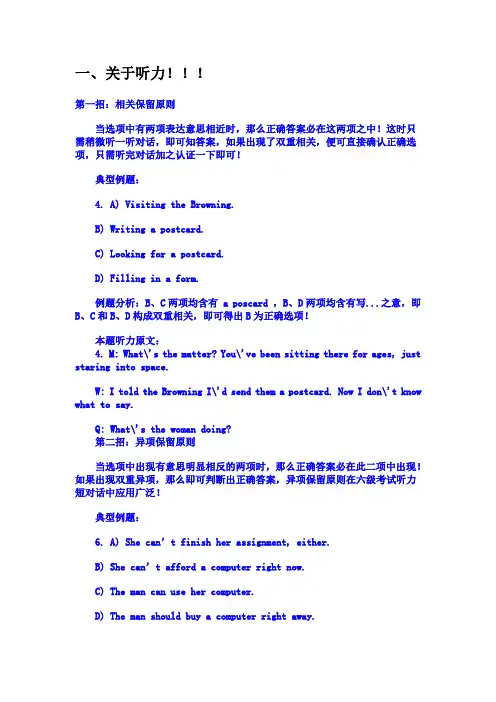
一、关于听力!!!第一招:相关保留原则当选项中有两项表达意思相近时,那么正确答案必在这两项之中!这时只需稍微听一听对话,即可知答案,如果出现了双重相关,便可直接确认正确选项,只需听完对话加之认证一下即可!典型例题:4. A) Visiting the Browning.B) Writing a postcard.C) Looking for a postcard.D) Filling in a form.例题分析:B、C两项均含有 a poscard ,B、D两项均含有写...之意,即B、C和B、D构成双重相关,即可得出B为正确选项!本题听力原文:4. M: What\'s the matter? You\'ve been sitting there for ages, just staring into space.W: I told the Browning I\'d send them a postcard. Now I don\'t know what to say.Q: What\'s the woman doing?第二招:异项保留原则当选项中出现有意思明显相反的两项时,那么正确答案必在此二项中出现!如果出现双重异项,那么即可判断出正确答案,异项保留原则在六级考试听力短对话中应用广泛!典型例题:6. A) She can’t finish her assignment, either.B) She can’t afford a computer right now.C) The man can use her computer.D) The man should buy a computer right away.例题分析:A、B异项,A项的意思是她现在有电脑,B项的意思则是她现在没有电脑。
B、D异项,B是说女方无电脑,而D是说男方无电脑,男女也是一种反意关系。
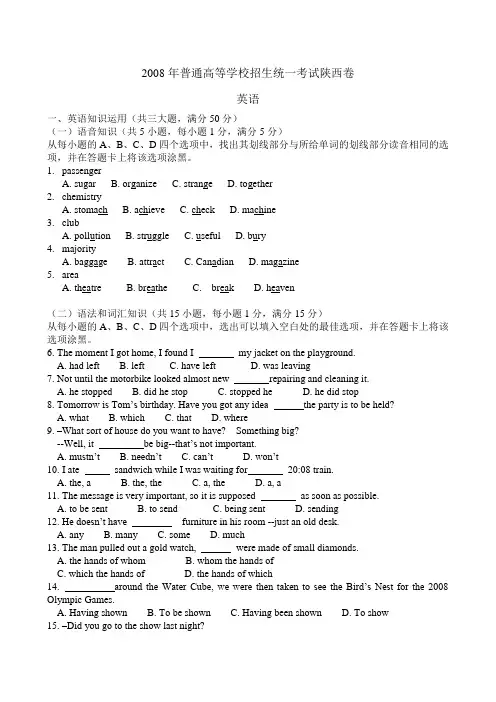
2008年普通高等学校招生统一考试陕西卷英语一、英语知识运用(共三大题,满分50分)(一)语音知识(共5小题,每小题1分,满分5分)从每小题的A、B、C、D四个选项中,找出其划线部分与所给单词的划线部分读音相同的选项,并在答题卡上将该选项涂黑。
1.passengerA. sugarB. organizeC. strangeD. together2.chemistryA. stomachB. achieveC. checkD. machine3.clubA. pollutionB. struggleC. usefulD. bury4.majorityA. baggageB. attractC. CanadianD. magazine5.areaA. theatreB. breatheC. breakD. heaven(二)语法和词汇知识(共15小题,每小题1分,满分15分)从每小题的A、B、C、D四个选项中,选出可以填入空白处的最佳选项,并在答题卡上将该选项涂黑。
6. The moment I got home, I found I my jacket on the playground.A. had leftB. leftC. have leftD. was leaving7. Not until the motorbike looked almost new repairing and cleaning it.A. he stoppedB. did he stopC. stopped heD. he did stop8. Tomorrow is Tom’s birthday. Have you got any idea the party is to be held?A. whatB. whichC. thatD. where9. –What sort of house do you want to have? Something big?--Well, it be big--that’s not important.A. m ustn’tB. needn’tC. can’tD. won’t10. I ate sandwich while I was waiting for 20:08 train.A. the, aB. the, theC. a, theD. a, a11. The message is very important, so it is supposed as soon as possible.A. to be sentB. to sendC. being sentD. sending12. He doesn’t have furniture in his room --just an old desk.A. anyB. manyC. someD. much13. The man pulled out a gold watch, were made of small diamonds.A. the hands of whomB. whom the hands ofC. which the hands ofD. the hands of which14. around the Water Cube, we were then taken to see the Bird’s Nest for the 2008 Olympic Games.A. Having shownB. To be shownC. Having been shownD. To show15. –Did you go to the show last night?–Yeah. Every boy and girl in the area invitedA. wereB. have beenC. has beenD. was16. Ten years ago the population of our village was that of theirs.A. as twice large asB. twice as large asC. twice as much asD. as twice much as17. Though we don’t know what discussed, yet we can feel the topic.A. had changedB. will changeC. was changedD. has been changed18. –The floor is dirty. Can anyone clean it?–I do it all the time.A. Don’t mention it.B. Why you?C. Not sureD. Not me again.19. Elizabeth has already achieved success her wildest dreams.A. atB. beyondC. withinD. upon20. It’s going to rain. Xiao Feng, Will you please help me the clothes on the line?A. get offB. get backC. get inD. get on(三)完形填空(共20小题,每小题1.5分,满分30分)阅读下在短文,从短文后各题的A、B、C、D四个选项中,选出适合填入对应空白处的最佳选项,并在答题卡上将该选项涂黑。
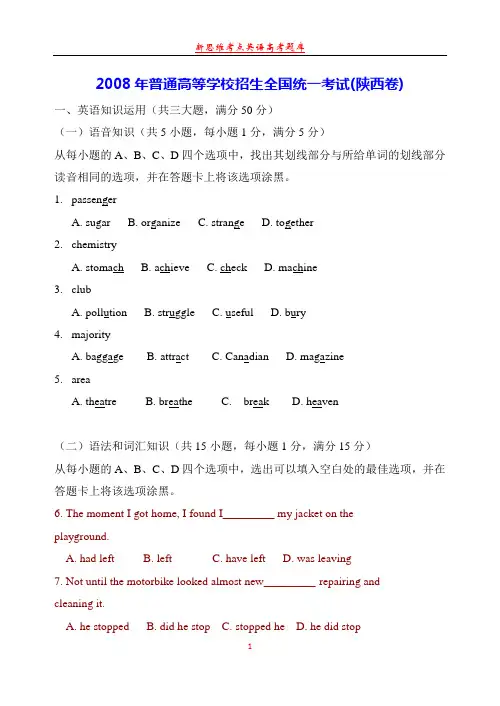
2008年普通高等学校招生全国统一考试(陕西卷)一、英语知识运用(共三大题,满分50分)(一)语音知识(共5小题,每小题1分,满分5分)从每小题的A、B、C、D四个选项中,找出其划线部分与所给单词的划线部分读音相同的选项,并在答题卡上将该选项涂黑。
1.passengerA. sugarB. organizeC. strangeD. together2.chemistryA. stomachB. achieveC. checkD. machine3.clubA. pollutionB. struggleC. usefulD. bury4.majorityA. baggageB. attractC. CanadianD. magazine5.areaA. theatreB. breatheC. breakD. heaven(二)语法和词汇知识(共15小题,每小题1分,满分15分)从每小题的A、B、C、D四个选项中,选出可以填入空白处的最佳选项,并在答题卡上将该选项涂黑。
6. The moment I got home, I found I_________ my jacket on theplayground.A. had leftB. leftC. have leftD. was leaving7. Not until the motorbike looked almost new_________ repairing andcleaning it.A. he stoppedB. did he stopC. stopped heD. he did stop8. Tomorrow is Tom’s birthday. Have you got any idea_________ the party is to be held?A. whatB. whichC. thatD. where9. ---What sort of house do you want to have? Something big?---Well, it_________ be big--that’s not import ant.A. mustn’tB. needn’tC. can’tD. won’t10. I ate_________ sandwich while I was waiting for_________ 20:08 train.A. the, aB. the, theC. a, theD. a, a11. The message is very important, so it is supposed_________ as soon as possible.A. to be sentB. to sendC. being sentD. sending12. He doesn’t have_________ furniture in his room --just an old desk.A. anyB. manyC. someD. much13. The man pulled out a gold watch,_________ were made of small diamonds.A. the hands of whomB. whom the hands ofC. which the hands ofD. the hands of which14._________around the Water Cube, we were then taken to see the Bird’s Nest for the 2008 Olympic Games.A. Having shownB. To be shownC. Having been shownD. To show15. ---Did you go to the show last night?---Yeah. Every boy and girl in the area_________ invitedA. wereB. have beenC. has beenD. was16. Ten years ago the population of our village was_________ that oftheirs.A. as twice large asB. twice as large asC. twice as much asD. as twice much as17. Though we don’t know what discussed, yet we can feel the topic_________.A. had changedB. will changeC. was changedD. has been changed18. ---The floor is dirty. Can anyone clean it?---_________ I do it all the time.A. Don’t mention it.B. Why you?C. Not sure.D. Not me again.19. Elizabeth has already achieved success_________ her wildestdreams.A. atB. beyondC. withinD. upon20. It’s going to rain. Xiao Feng, Will you please help me_________the clothes on the line?A. get offB. get backC. get inD. get on(三)完形填空(共20小题,每小题1.5分,满分30分)阅读下在短文,从短文后各题的A、B、C、D四个选项中,选出适合填入对应空白处的最佳选项,并在答题卡上将该选项涂黑。
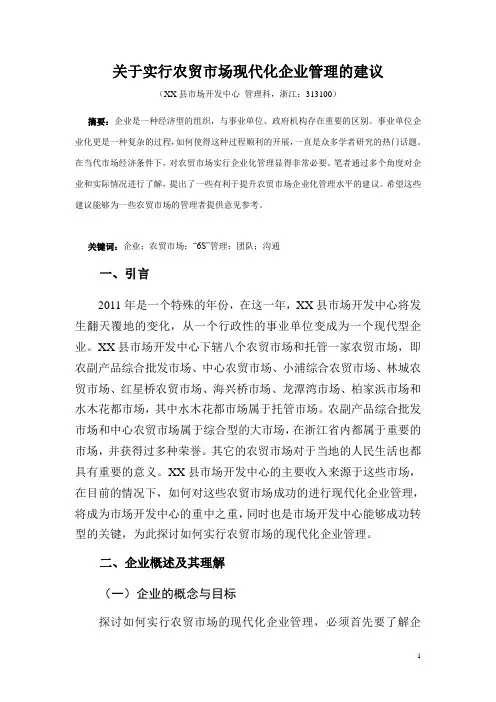
关于实行农贸市场现代化企业管理的建议(XX县市场开发中心管理科,浙江:313100)摘要:企业是一种经济型的组织,与事业单位、政府机构存在重要的区别。
事业单位企业化更是一种复杂的过程,如何使得这种过程顺利的开展,一直是众多学者研究的热门话题。
在当代市场经济条件下,对农贸市场实行企业化管理显得非常必要。
笔者通过多个角度对企业和实际情况进行了解,提出了一些有利于提升农贸市场企业化管理水平的建议。
希望这些建议能够为一些农贸市场的管理者提供意见参考。
关键词:企业;农贸市场;“6S”管理;团队;沟通一、引言2011年是一个特殊的年份,在这一年,XX县市场开发中心将发生翻天覆地的变化,从一个行政性的事业单位变成为一个现代型企业。
XX县市场开发中心下辖八个农贸市场和托管一家农贸市场,即农副产品综合批发市场、中心农贸市场、小浦综合农贸市场、林城农贸市场、红星桥农贸市场、海兴桥市场、龙潭湾市场、柏家浜市场和水木花都市场,其中水木花都市场属于托管市场。
农副产品综合批发市场和中心农贸市场属于综合型的大市场,在浙江省内都属于重要的市场,并获得过多种荣誉。
其它的农贸市场对于当地的人民生活也都具有重要的意义。
XX县市场开发中心的主要收入来源于这些市场,在目前的情况下,如何对这些农贸市场成功的进行现代化企业管理,将成为市场开发中心的重中之重,同时也是市场开发中心能够成功转型的关键,为此探讨如何实行农贸市场的现代化企业管理。
二、企业概述及其理解(一)企业的概念与目标探讨如何实行农贸市场的现代化企业管理,必须首先要了解企业。
现代性企业是一个历史概念,它不是从来就有的。
在封建社会及以前的社会,人类社会没有企业这个名称。
只是当人类发展到资本主义社会时,企业这个名称才应运而生。
在资本主义社会,人们将个人投资或几个人共同投资兴办的经济组织称为企业。
从企业的英文“Enterprise”的原意来看,它代表一种进取和冒险的意识或思想。
因此,企业是有明确的个人来承担亏损责任、并获得利益的经济组织。
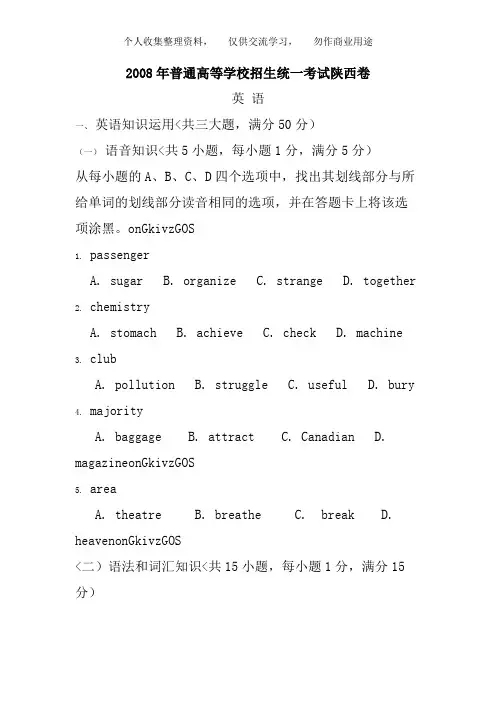
2008年普通高等学校招生统一考试陕西卷英语一、英语知识运用<共三大题,满分50分)(一)语音知识<共5小题,每小题1分,满分5分)从每小题的A、B、C、D四个选项中,找出其划线部分与所给单词的划线部分读音相同的选项,并在答题卡上将该选项涂黑。
onGkivzGOS1.passengerA. sugarB. organizeC. strangeD. together2.chemistryA. stomachB. achieveC. checkD. machine3.clubA. pollutionB. struggleC. usefulD. bury4.majorityA. baggageB. attractC. CanadianD. magazineonGkivzGOS5.areaA. theatreB. breatheC. breakD. heavenonGkivzGOS<二)语法和词汇知识<共15小题,每小题1分,满分15分)从每小题的A、B、C、D四个选项中,选出可以填入空白处的最佳选项,并在答题卡上将该选项涂黑。
6. The moment I got home, I found I myjacket on the playground.onGkivzGOSA. had leftB. leftC. have leftD.was leavingonGkivzGOS7. Not until the motorbike looked almost new repairing and cleaning it.onGkivzGOSA. he stoppedB. did he stopC. stopped heD. he did stoponGkivzGOS8. Tomorrow is Tom’s birthday. Have you got anyidea the party is to be held?onGkivzGOSA. whatB. whichC. thatD. where9. –What sort of house do you want to have?Something big?onGkivzGOS--Well, it be big--that’s not important.A. mustn’tB. needn’tC. can’tD.won’t10. I ate sandwich while I was waiting for 20:08 train.onGkivzGOSA. the, aB. the, theC. a, theD.a, aonGkivzGOS11. The message is very important, so it issupposed as soon as possible.onGkivzGOSA. to be sentB. to sendC. being sentD. sendingonGkivzGOS12. He doesn’t have furniture in hisroom --just an old desk.onGkivzGOSA. anyB. manyC. someD. much13. The man pulled out a gold watch, weremade of small diamonds.onGkivzGOSA. the hands of whomB. whom the hands ofC. which the hands ofD. the hands ofwhich14. around the Water Cube, we were thentaken to see the Bird’s Nest for the 2008 Olympic Games.onGkivzGOSA. Having shownB. To be shownC. Havingbeen shown D. To showonGkivzGOS15. –Did you go to the show last night?–Yeah. Every boy and girl in the area invitedonGkivzGOSA. wereB. have beenC. has beenD.was16. Ten years ago the population of our village was that of theirs.onGkivzGOSA. as twice large asB. twice as large asC. twice as much asD. as twice much as17. Though we don’t know what discussed, yet wecan feel the topic .onGkivzGOSA. had changedB. will changeC. waschanged D. has been changedonGkivzGOS18. –The floor is dirty. Can anyone clean it?– I do it all the time.A. Don’t mention it.B. Why you?C.Not sure D. Not me again.onGkivzGOS19. Elizabeth has already achieved successher wildest dreams.onGkivzGOSA. atB. beyondC. withinD. upon20. It’s going to rain. Xiao Feng, Will you pleasehelp me the clothes on the line?onGkivzGOSA. get offB. get backC. get inD.get ononGkivzGOS(三>完形填空<共20小题,每小题1.5分,满分30分)阅读下在短文,从短文后各题的A、B、C、D四个选项中,选出适合填入对应空白处的最佳选项,并在答题卡上将该选项涂黑。
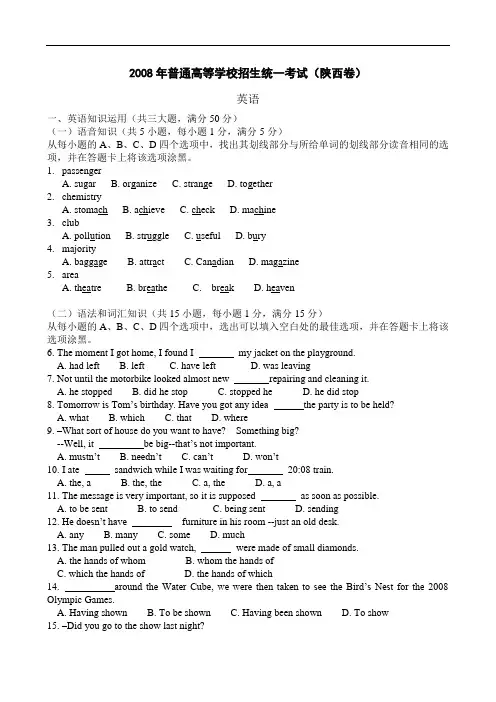
2008年普通高等学校招生统一考试(陕西卷)英语一、英语知识运用(共三大题,满分50分)(一)语音知识(共5小题,每小题1分,满分5分)从每小题的A、B、C、D四个选项中,找出其划线部分与所给单词的划线部分读音相同的选项,并在答题卡上将该选项涂黑。
1.passengerA. sugarB. organizeC. strangeD. together2.chemistryA. stomachB. achieveC. checkD. machine3.clubA. pollutionB. struggleC. usefulD. bury4.majorityA. baggageB. attractC. CanadianD. magazine5.areaA. theatreB. breatheC. breakD. heaven(二)语法和词汇知识(共15小题,每小题1分,满分15分)从每小题的A、B、C、D四个选项中,选出可以填入空白处的最佳选项,并在答题卡上将该选项涂黑。
6. The moment I got home, I found I my jacket on the playground.A. had leftB. leftC. have leftD. was leaving7. Not until the motorbike looked almost new repairing and cleaning it.A. he stoppedB. did he stopC. stopped heD. he did stop8. Tomorrow is Tom’s birthday. Have you got any idea the party is to be held?A. whatB. whichC. thatD. where9. –What sort of house do you want to have? Something big?--Well, it be big--that’s not important.A. mustn’tB. needn’tC. can’tD. won’t10. I ate sandwich while I was waiting for 20:08 train.A. the, aB. the, theC. a, theD. a, a11. The message is very important, so it is supposed as soon as possible.A. to be sentB. to sendC. being sentD. sending12. He doesn’t have furniture in his room --just an old desk.A. anyB. manyC. someD. much13. The man pulled out a gold watch, were made of small diamonds.A. the hands of whomB. whom the hands ofC. which the hands ofD. the hands of which14. around the Water Cube, we were then taken to see the Bird’s Nest for the 2008 Olympic Games.A. Having shownB. To be shownC. Having been shownD. To show15. –Did you go to the show last night?–Yeah. Every boy and girl in the area invitedA. wereB. have beenC. has beenD. was16. Ten years ago the population of our village was that of theirs.A. as twice large asB. twice as large asC. twice as much asD. as twice much as17. Though we don’t know what discussed, yet we can feel the topic.A. had changedB. will changeC. was changedD. has been changed18. –The floor is dirty. Can anyone clean it?–I do it all the time.A. Don’t mention it.B. Why you?C. Not sureD. Not me again.19. Elizabeth has already achieved success her wildest dreams.A. atB. beyondC. withinD. upon20. I t’s going to rain. Xiao Feng, Will you please help me the clothes on the line?A. get offB. get backC. get inD. get on(三)完形填空(共20小题,每小题1.5分,满分30分)阅读下在短文,从短文后各题的A、B、C、D四个选项中,选出适合填入对应空白处的最佳选项,并在答题卡上将该选项涂黑。
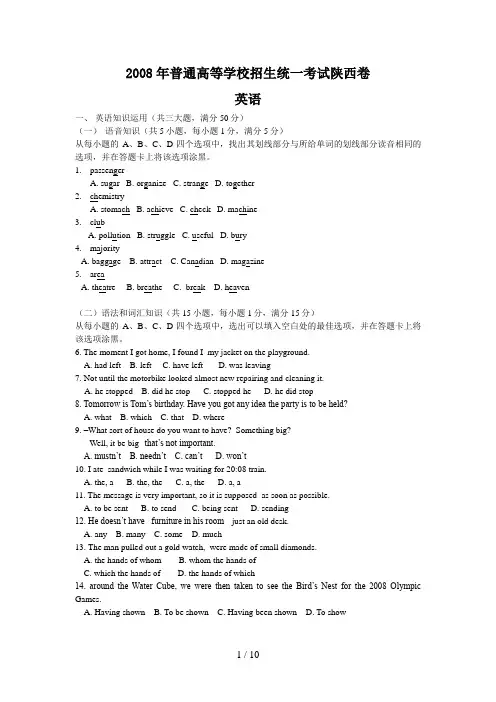
2008年普通高等学校招生统一考试陕西卷英语一、英语知识运用(共三大题,满分50分)(一)语音知识(共5小题,每小题1分,满分5分)从每小题的A、B、C、D四个选项中,找出其划线部分与所给单词的划线部分读音相同的选项,并在答题卡上将该选项涂黑。
1.passengerA. sugarB. organizeC. strangeD. together2.chemistryA. stomachB. achieveC. checkD. machine3.clubA. pollutionB. struggleC. usefulD. bury4.majorityA. baggageB. attractC. CanadianD. magazine5.areaA. theatreB. breatheC. breakD. heaven(二)语法和词汇知识(共15小题,每小题1分,满分15分)从每小题的A、B、C、D四个选项中,选出可以填入空白处的最佳选项,并在答题卡上将该选项涂黑。
6. The moment I got home, I found I my jacket on the playground.A. had leftB. leftC. have leftD. was leaving7. Not until the motorbike looked almost new repairing and cleaning it.A. he stoppedB. did he stopC. stopped heD. he did stop8. Tomorrow is Tom’s birthday. Have you got any idea the party is to be held?A. whatB. whichC. thatD. where9. –What sort of house do you want to have? Something big?--Well, it be big--that’s not important.A. mustn’tB. needn’tC. can’tD. won’t10. I ate sandwich while I was waiting for 20:08 train.A. the, aB. the, theC. a, theD. a, a11. The message is very important, so it is supposed as soon as possible.A. to be sentB. to sendC. being sentD. sending12. He doesn’t have furniture in his room --just an old desk.A. anyB. manyC. someD. much13. The man pulled out a gold watch, were made of small diamonds.A. the hands of whomB. whom the hands ofC. which the hands ofD. the hands of which14. around the Water Cube, we were then taken to see the Bird’s Nest for the 2008 Olympic Games.A. Having shownB. To be shownC. Having been shownD. To show15. –Did you go to the show last night?–Yeah. Every boy and girl in the areainvitedA. wereB. have beenC. has beenD. was16. Ten years ago the population of our village was that of theirs.A. as twice large asB. twice as large asC. twice as much asD. as twice much as17. Though we don’t know what discussed, yet we can feel the topic.A. had changedB. will changeC. was changedD. has been changed18. –The floor is dirty. Can anyone clean it?– I do it all the time.A. Don’t mention it.B. Why you?C. Not sureD. Not me again.19. Elizabeth has already achieved success her wildest dreams.A. atB. beyondC. withinD. upon20. It’s going to rain. Xiao Feng, Will you please help me the clothes on the line?A. get offB. get backC. get inD. get on(三)完形填空(共20小题,每小题1.5分,满分30分)阅读下在短文,从短文后各题的A、B、C、D四个选项中,选出适合填入对应空白处的最佳选项,并在答题卡上将该选项涂黑。
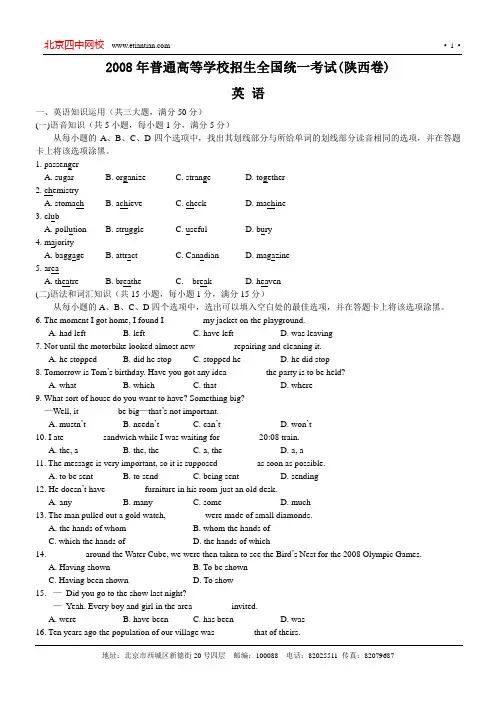
2008年普通高等学校招生全国统一考试(陕西卷)英语一、英语知识运用(共三大题,满分50分)(一)语音知识(共5小题,每小题1分,满分5分)从每小题的A、B、C、D四个选项中,找出其划线部分与所给单词的划线部分读音相同的选项,并在答题卡上将该选项涂黑。
1. passengerA. sugarB. organizeC. strangeD. together2. chemistryA. stomachB. achieveC. checkD. machine3. clubA. pollutionB. struggleC. usefulD. bury4. majorityA. baggageB. attractC. CanadianD. magazine5. areaA. theatreB. breatheC. breakD. heaven(二)语法和词汇知识(共15小题,每小题1分,满分15分)从每小题的A、B、C、D四个选项中,选出可以填入空白处的最佳选项,并在答题卡上将该选项涂黑。
6. The moment I got home, I found I ________ my jacket on the playground.A. had leftB. leftC. have leftD. was leaving7. Not until the motorbike looked almost new ________ repairing and cleaning it.A. he stoppedB. did he stopC. stopped heD. he did stop8. Tomorrow is Tom’s birthday. Have you got any idea ________ the party is to be held?A. whatB. whichC. thatD. where9. What sort of house do you want to have? Something big?—Well, it ________ be big—that’s not important.A. mustn’tB. needn’tC. can’tD. won’t10. I ate ________ sandwich while I was waiting for ________ 20:08 train.A. the, aB. the, theC. a, theD. a, a11. The message is very important, so it is supposed ________ as soon as possible.A. to be sentB. to sendC. being sentD. sending12. He doesn’t have ________ furniture in his room-just an old desk.A. anyB. manyC. someD. much13. The man pulled out a gold watch, ________ were made of small diamonds.A. the hands of whomB. whom the hands ofC. which the hands ofD. the hands of which14. ________ around the Water Cube, we were then taken to see the Bird’s Nest for the 2008 Olympic Games.A. Having shownB. To be shownC. Having been shownD. To show15. —Did you go to the show last night?—Y eah. Every boy and girl in the area ________ invited.A. wereB. have beenC. has beenD. was16. Ten years ago the population of our village was ________ that of theirs.A. as twice large asB. twice as large asC. twice as much asD. as twice much as17. Though we don’t know what discussed, yet we can feel the topic ________.A. had changed B will changeC. was changedD. has been changed18. —The floor is dirty. Can anyone clean it?—________ I do it all the time.A. Don’t mention it.B. Why you?C. Not sure.D. Not me again.19. Elizabeth has already achieved success ________ her wildest dreams.A. atB. beyondC. withinD. upon20. It’s going to rain. Xiao Feng, will you please help me ________ the clothes on the line?A. get offB. get backC. get inD. get on(三)完形填空(共20小题,每小题1.5分,满分30分)阅读下面短文,从短文后各题的A、B、C、D四个选项中,选出适合填入对应空白处的最佳选项,并在答题卡将该选项涂黑。
2008全国招生统一考试英语试题陕西卷(一)阅读下列五篇短文,从每小题后所给的A、B、C、D四个选项中,选出最佳选项并在答题卡上将该选项涂黑。
AThey say there are three ways to experience the Grand Canyon: on foot, on mules(骡子) or by air. We chose the first. Up early; my husband and I and our three children couldn’t w ait to get started. We decided to walk along a lovely path named Bright Angel Trail.As we set out, I was shocked at how narrow the path was. And I couldn’t help noticing that the other tourists weren’t like us. They had heavy backpacks, water bottles, an d hats. But as usual we were dressed. As the sun rose higher, Arizona’s famous heat seemed to roast(烘烤)us. There was no shade and our legs were aching. We decided to go back, with the girl on my back and the boys far behind. By the time we finally got back, our legs were like jelly.The next day, after we’d had a long rest and a good breakfast, we were ready for another view of the Canyon – by air. After our last walk, this would be the easiest thing in the world.We called to each other excitedly as the plane took off and circled around the Canyon. But the smiles on our faces disappeared as the pilot tossed(翻转)the plane around, pretending he was going to hit the ground. I shouted, “STOP, TAKE US BACK!” When we finally arrived back on land, once again our legs were like jelly. We hardly spoke as we drove back.As I said, there are three ways to view the Grand Canyon. We never tried the mules, but personally I’d suggest a fourth: buy yourself a good magazine like National Geographic. That way, you can see the Canyon, without fear or tiredness.41. Which of the following is true according to the second paragraph?A. They made a careful preparation before the tripB. The children were more joyful than their parents.C. Bright Angel Trail was not as lovely as they expected.D. The summer heat prevented them from enjoying the view.42. The underlined expression “Our legs were like jelly” probably means .A. we were weakB. we were unhappyC. we were dissatisfiedD. we were disappointed43. Which of the following best describes their Canyon trip by air?A. It proved to be frightening.B. It was more comfortable.C. It turned out to be exciting.D. It made each of them tired.44. We can infer from the passage that .A. experiencing the Canyon on mules would be the best wayB. one needs to dress less when visiting the Grand Canyon.C. the writer was not serious when she made the suggestion.D. the whole family narrowly escaped from the air accident.BPhotographs are everywhere. They decorate (装饰) the walls of homes and are used in stores for sales of different goods. The news is filled with pictures of fires, floods, and special events. Photos record the beauties of nature. They can also bring things close that are far away. Through photos, people can see wild animals, cities in foreign lands, and even the stars in outer space. Photos also tell stories.Reporting the news through photos is called photojournalism. At times photojournalists tell their stories through a single picture. At other times, they use a group of pictures to tell a story. Each picture is like a chapter in a book, which can do more than record the facts. It can also be a strong force for social change.Jacob Riis was among the first photojournalists. He took pictures of parts of New York City where the poor lived. Riis believed that poverty(贫穷)caused crime, and he used photos to help him prove his point. A few years later, the photos of small children working in factories by Lewis Hine shocked the public. Hine’s pictures helped bring about laws to protect such children.Hundreds of pictures may have to be taken in order to get one or two really good photos. It takes science to have the photo come out clearly and art to make a photo that has a good design and expresses feeling. Photojournalists make an actual record of what they see. A photo, however, can be both a work of art and an actual record. It can record an important event as a beautiful or exciting picture.As historical and artistic documents(文献) , photos can become more important over time. Today photojournalists still have their pictures appear in newspapers and magazines. They also publish(发表) them in books and on the Internet.45. The underlined word “They” in the first paragraph refers to.A. beautiesB. photosC. goodsD. events46. The photos of the small children by Hine show us that photos .A. are also works of artB. are popular ways of reporting newsC. often shock the publicD. can serve as a force for social change47. What can we learn from the passage?A. News with pictures is encouraging.B. Photos help people improve.C. News photos mean history in a sense.D. People prefer reading news with pictures.48. The text is mainly about .A. telling the story through picturesB. decorating the walls of homesC. publishing historical papersD. expressing feeling through picturesCThis was no ordinary class. The students who came together were all science or engineering professors at Cornell University. They had interrupted their research to accept an invitation to take part in an unusual experiment: “an interesting week of poetry.” This class was part of a study to answer the questions: Why is science difficult for many non-science students? What can teachers learn about teaching if they take a class that is not in their field?The students in the poetry class listened to lectures and took notes. They had reading tasks and had to write three short papers. All students noticed one thing – the importance of spoken words. In science and engineering classes, the instructors put tables and drawings on the blackboard. But in this poetry class, the instructors just talked. They didn’t write anything on the board.The scientists and engineers noticed one similarity between science and poetry. In both subjects, students need to find layers (层次) of meaning. Some layers are simple, clean, and on the surface; other layers are deeper and more difficult. This search for different levels of meaning do esn’t happen much in undergraduate(本科) science classes, but it is important later, in graduate school. And it is always important in humanities(人文学科).Both the poetry instructors and their students learned something about teaching from this experience. One poetry instructor, for example, now sees the importance of using careful, clear definitions (定义)when he explains a poem. He also plans to be more informative as he teaches.Most of the scientists agreed on several points. First, humanities classes might help science students to see patterns and decide which information is important. Second, the poetry class was fun. One engineer decided, “We need to change the way we teach engineering to make it an enjoyable experience for students.”But perhaps the most important result of the experience was this: All of the professors began to think about how they teach and how they can teach better.49. What do we know about this unusual class?A. The teachers did lots of writing on the board.B. The teachers were invited to attend several lectures.C. The students were professors from a university.D. The students were studying science and humanities.50. The experiment was designed to find out .A. how to teach the students in the science classB. whether poetry is difficult for science studentsC. what to be taught in the humanities classD. why many humanities students find science hard51. Finding levels of meaning is .A. important for graduate students in humanitiesB. difficult for graduate students in humanitiesC. common for undergraduate students in scienceD. easy for undergraduate students in science.52. What did the science professors learn after the experiment?A. They should change the way they teach.B. A poem could be explained in clear definitions.C. A poetry class could be more informative.D. Their teaching was an enjoyable experience.DRunners in a relay(接力) race pass a stick in one direction. However, merchants passed silk, gold, fruit, and glass along the Silk Road in more than one direction. They earned their living bytraveling the famous Silk Road.The Silk Road was not a simple trading network. It passed through thousands of cities and towns. It started from eastern China, across Central Asia and the Middle East, and ended in the Mediterranean Sea. It was used from about 200 B. C. to about A. D. 1300, when sea travel offered new routes (路线). It was sometimes called the world’s longest highway. However, the Silk Road was made up of many routes, not one smooth path. They passed through what are now 18 countries. The routes crossed mountains and deserts and had many dangers of hot sun, deep snow and even battles. Only experienced traders could return safe.The Silk Road got its name from its most prized product. Silk could be used like money to pay taxes or buy goods. But the traders carried more than just silk. Gold, silver, and glass from Europe were much found in the Middle East and Asia. Horses traded from other areas changed farming practices in China. Indian merchants traded salt and other valuable goods. Chinese merchants traded paper, which produced an immediate effect on the West. Apples traveled from central Asia to Rome. The Chinese had learned to graft (嫁接) different trees together to make new kinds of fruit. They passed this science on to others, including the Romans. The Romans used grafting to grow the apple. Trading along the Silk Road led to world-wide business 2,000 years before the World Wide Web.The people along the Silk Road did not share just goods. They also shared their beliefs. The Silk Road provided pathways for learning, diplomacy(外交), and religion (宗教)53. It’s pro bable that traders along the Silk Road needed .A. to remember the entire trade routeB. to know the making of productsC. to receive certain special trainingD. to deal with a lot of difficulties54. The Silk Road became less important because .A. it was made up of different routesB. silk trading became less popularC. sea travel provided easier routesD. people needed fewer foreign goods55. New technologies could travel along the Silk Road because people .A. learned from one anotherB. shared each other’s beliefsC. traded goods along the routeD. earned their living by traveling56. What is the best title for the passage?A. The Silk Road: Past and PresentB. The Silk Road: East Meets WestC. The Silk Road: Routes Full of DangersD. The Silk Road: Pathways for LearningEDid you know that women’s brains are smaller than men’s? The average women’s brain weighs 10% less than men’s. Since research has shown that the bigger the brain, the cleverer the animal, men must be more intelligent than women. Right? Wrong. Men and women always score similarly on intelligence tests, despite the difference in brain size. Why? After years of study, researchers have concluded that it’s what’s inside that matters, not just the size of the brain. The brain consists of “grey matter” and“white matter”. While men have more of the latter, the amount of “thinking” brain is almost exactly the same in both sexes.It has been suggested that smaller brain appears to work faster, perhaps because the two sides of the brain are better connected in women. This means that little girls tend to learn to speak earlier, and that women can understand sorts of information from different sources at the same time. When it comes to talking to the boss on the phone, cooking dinner and keeping an eye on the baby all at the same time, it’s women who come out on top every time.There are other important differences between two sexes. As white matter is the key to spatial(空间的) tasks, men know better where things are in relation to other things. “A great footballer always knows where he is in relation to the other players, and h e knows where to go,” says one researcher. That may explain one of life’s great mysteries: why men refuse to ask for directions … and women often need to!The differences begin when fetuses(胎儿) are about nine weeks old, which can be seen in the action of children as young as one. A boy would try to climb a barrier (障碍物) before him or push it down while a girl would attract help from others. These brain differences also explain the fact that more men take up jobs that require good spatial skills, while more women speech skills. It may all go back to our ancestors(祖先) , among whom women needed speech skills to take care of their babies and men needed spatial skills to hunt, according to one research.If all this disappoints you, it shouldn’t. “The brain changes throughout our lives according to what we do with it.” says a biologist.57. Which of the following is true according to the first paragraph?A. Women’s brain is 10% less than men’s.B. Grey matter plays the same role as white matter.C. Grey matter controls thinking in the brain.D. Both sexes have the same amount of white matter.58. What can we infer from the second and third paragraphs?A. Women prefer doing many things at a time.B. Men do better dealing with one job at a time.C. Women do not need to tell directions.D. Men have weaker spatial abilities.59. Which of the following do you agree with according to the fourth paragraph?A. Young boys may be stronger than young girls.B. More women take up jobs requiring speech skills.C. Women may have stronger feelings than men.D. Our ancestors needed more spatial skills.60. What is the writer’s attitude in writing this passage?A. Defensive.B. Persuasive.C. Supportive.D. Objective.41.CAACB DCACD 51. AADCA BCBBD。
2008年普通高等学校招生统一考试陕西卷英语一、英语知识运用(共三大题,满分50分)(一)语音知识(共5小题,每小题1分,满分5分)从每小题的A、B、C、D四个选项中,找出其划线部分与所给单词的划线部分读音相同的选项,并在答题卡上将该选项涂黑。
1.passengerA. sugarB. organizeC. strangeD. together2.chemistryA. stomachB. achieveC. checkD. machine3.clubA. pollutionB. struggleC. usefulD. bury4.majorityA. baggageB. attractC. CanadianD. magazine5.areaA. theatreB. breatheC. breakD. heaven(二)语法和词汇知识(共15小题,每小题1分,满分15分)从每小题的A、B、C、D四个选项中,选出可以填入空白处的最佳选项,并在答题卡上将该选项涂黑。
6. The moment I got home, I found I my jacket on the playground.A. had leftB. leftC. have leftD. was leaving7. Not until the motorbike looked almost new repairing and cleaning it.A. he stoppedB. did he stopC. stopped heD. he did stop8. Tomorrow is Tom’s birthday. Have you got any idea the party is to be held?A. whatB. whichC. thatD. where9. –What sort of house do you want to have? Something big?--Well, it be big--that’s not important.A. m ustn’tB. needn’tC. can’tD. won’t10. I ate sandwich while I was waiting for 20:08 train.A. the, aB. the, theC. a, theD. a, a11. The message is very important, so it is supposed as soon as possible.A. to be sentB. to sendC. being sentD. sending12. He doesn’t have furniture in his room --just an old desk.A. anyB. manyC. someD. much13. The man pulled out a gold watch, were made of small diamonds.A. the hands of whomB. whom the hands ofC. which the hands ofD. the hands of which1英语学习网英语教师网aroundOlympic Games.A. Having shownB. To be shownC. Having been shownD. To show15. –Did you go to the show last night?–Yeah. Every boy and girl in the area invitedA. wereB. have beenC. has beenD. was16. Ten years ago the population of our village was that of theirs.A. as twice large asB. twice as large asC. twice as much asD. as twice much as17. Though we don’t know what discussed, yet we can feel the topic.A. had changedB. will changeC. was changedD. has been changed18. –The floor is dirty. Can anyone clean it?–I do it all the time.A. Don’t mention it.B. Why you?C. Not sureD. Not me again.19. Elizabeth has already achieved success her wildest dreams.A. atB. beyondC. withinD. upon20. It’s going to rain. Xiao Feng, Will you please help me the clothes on the line?A. get offB. get backC. get inD. get on(三)完形填空(共20小题,每小题1.5分,满分30分)阅读下在短文,从短文后各题的A、B、C、D四个选项中,选出适合填入对应空白处的最佳选项,并在答题卡上将该选项涂黑。
2008年普通高等学校招生统一考试陕西卷英语一、英语知识运用(共三大题,满分50分)(一)语音知识(共5小题,每小题1分,满分5分)从每小题的A、B、C、D四个选项中,找出其划线部分与所给单词的划线部分读音相同的选项,并在答题卡上将该选项涂黑。
1.passengerA. sugarB. organizeC. strangeD. together2.chemistryA. stomachB. achieveC. checkD. machine3.clubA. pollutionB. struggleC. usefulD. bury4.majorityA. baggageB. attractC. CanadianD. magazine5.areaA. theatreB. breatheC. breakD. heaven(二)语法和词汇知识(共15小题,每小题1分,满分15分)从每小题的A、B、C、D四个选项中,选出可以填入空白处的最佳选项,并在答题卡上将该选项涂黑。
6. The moment I got home, I found I my jacket on the playground.A. had leftB. leftC. have leftD. was leaving7. Not until the motorbike looked almost new repairing and cleaning it.A. he stoppedB. did he stopC. stopped heD. he did stop8. Tomorrow is Tom’s birthday. Have you got any idea the party is to be held?A. whatB. whichC. thatD. where9. –What sort of house do you want to have? Something big?--Well, it be big--that’s not important.A. m ustn’tB. needn’tC. can’tD. won’t10. I ate sandwich while I was waiting for 20:08 train.A. the, aB. the, theC. a, theD. a, a11. The message is very important, so it is supposed as soon as possible.A. to be sentB. to sendC. being sentD. sending12. He doesn’t have furniture in his room --just an old desk.A. anyB. manyC. someD. much13. The man pulled out a gold watch, were made of small diamonds.A. the hands of whomB. whom the hands ofC. which the hands ofD. the hands of which14. around the Water Cube, we were then taken to see the Bird’s Nest for the 2008 Olympic Games.A. Having shownB. To be shownC. Having been shownD. To show15. –Did you go to the show last night?–Yeah. Every boy and girl in the area invitedA. wereB. have beenC. has beenD. was16. Ten years ago the population of our village was that of theirs.A. as twice large asB. twice as large asC. twice as much asD. as twice much as17. Though we don’t know what discussed, yet we can feel the topic.A. had changedB. will changeC. was changedD. has been changed18. –The floor is dirty. Can anyone clean it?–I do it all the time.A. Don’t mention it.B. Why you?C. Not sureD. Not me again.19. Elizabeth has already achieved success her wildest dreams.A. atB. beyondC. withinD. upon20. It’s going to rain. Xiao Feng, Will you please help me the clothes on the line?A. get offB. get backC. get inD. get on(三)完形填空(共20小题,每小题1.5分,满分30分)阅读下在短文,从短文后各题的A、B、C、D四个选项中,选出适合填入对应空白处的最佳选项,并在答题卡上将该选项涂黑。
2008年普通高等学校招生统一考试陕西卷英语一、英语知识运用(共三大题,满分50分)(一)语音知识(共5小题,每小题1分,满分5分)从每小题的A、B、C、D四个选项中,找出其划线部分与所给单词的划线部分读音相同的选项,并在答题卡上将该选项涂黑。
1.passengerA.sugaranizeC.strangeD.together2.chemistryA.stomachB.achieveC.checkD.machine3.clubA.pollutionB.struggleefulD.bury4.majorityA.baggageB.attractC.CanadianD.magazine5.areaA.theatreB.breatheC.breakD.heaven(二)语法和词汇知识(共15小题,每小题1分,满分15分)从每小题的A、B、C、D四个选项中,选出可以填入空白处的最佳选项,并在答题卡上将该选项涂黑。
6.The moment I got home,I found I my jacket on the playground.A.had leftB.leftC.have leftD.was leaving7.Not until the motorbike looked almost new repairing and cleaning it.A.he stoppedB.did he stopC.stopped heD.he did stop8.Tomorrow is Tom’s birthday.Have you got any idea the party is to be held?A.whatB.whichC.thatD.where9.–What sort of house do you want to have?Something big?--Well,it be big--that’s not important.A.mustn’tB.needn’tC.can’tD.won’t10.I ate sandwich while I was waiting for20:08train.A.the,aB.the,theC.a,theD.a,a11.The message is very important,so it is supposed as soon as possible.A.to be sentB.to sendC.being sentD.sending12.He doesn’t have furniture in his room--just an old desk.A.anyB.manyC.someD.much13.The man pulled out a gold watch,were made of small diamonds.A.the hands of whomB.whom the hands ofC.which the hands ofD.the hands of which14.around the Water Cube,we were then taken to see the Bird’s Nest for the2008 Olympic Games.A.Having shownB.To be shownC.Having been shownD.To show15.–Did you go to the show last night?–Yeah.Every boy and girl in the area invitedA.wereB.have beenC.has beenD.was16.Ten years ago the population of our village was that of theirs.A.as twice large asB.twice as large asC.twice as much asD.as twice much as17.Though we don’t know what discussed,yet we can feel the topic.A.had changedB.will changeC.was changedD.has been changed18.–The floor is dirty.Can anyone clean it?–I do it all the time.A.Don’t mention it.B.Why you?C.Not sureD.Not me again.19.Elizabeth has already achieved success her wildest dreams.A.atB.beyondC.withinD.upon20.It’s going to rain.Xiao Feng,Will you please help me the clothes on the line?A.get offB.get backC.get inD.get on(三)完形填空(共20小题,每小题1.5分,满分30分)阅读下在短文,从短文后各题的A、B、C、D四个选项中,选出适合填入对应空白处的最佳选项,并在答题卡上将该选项涂黑。
Unit 3 FriendshipⅠ. Useful SentencesDirections: You are going to hear ten sentences, listen to them carefully. There will be a pause at the end of each sentence. You arerequired to fill in the corresponding blank according to whatyou hear.Keys1. dealings2. exactly3. need4. admitted5. complain6. package7. stayed8. make9. quite 10. drivingⅡ. Short ConversationsDirections: You are going to hear ten short conversations. A question will follow each conversation. Listen and choose the best answerfrom the four possible choices.Tapescript1. M: How about your party last night?W: It was so interesting that no one was absent.Q: What does the woman mean?2. W: My best friend came to see me and we chatted for a long time. We have been friends for about 13 years.M: Wow, that’s really a long time.Q: What can we know from the conversation?3. W: Is Linda supposed to be here today?M: Actually she was supposed to come next week, but she’s coming tomorrow instead.Q: When will Linda arrive?4. W: Well, I’ll see you later. My husband is waiting for me to see a film.M: OK, give him my regards. I look forward to seeing you both on Saturday. Q: What may be the relationship between the man and the woman?5. W: Mark, you look so tired.M: I am. I’ve b een working on the report for the conference for three days and nights.Q:Why is the man tired?6. W: I want to invite the Smiths to the party. Do you know their new address? M: No, but I’d like them to come. I think Dick can give you their address.Q: What is the woman probably going to do?7. W: I heard you’ve got the highest marks in our class. Congratulations!M: Thank you. I’m sure you’ve also done a good job.Q: Who are the speakers?8. W: Yesterday we went to Jane’s house to listen to record.M: I heard she had more than a hundred jazz records. Is that true?Q: What do we learn about Jane?9. W: Have you known Mr. Johnson for a long time?M: Yes, quite some time, about two or three years.Q: What can we learn from the conversation?10. W: What kind of qualities do you look for in friends?M: I like friends who have something in common with me.Q: What is the woman asking the man about?Keys1. C2. C3. B4. A5. B6. B7. A8. A9. C 10. CⅢ. Long ConversationsDirections: You are going to hear two long conversations. Listen carefully and fill in the blanks.KeysTask 11. look2. with3. lost4. sorry5. friendship6. makeTask 21. make2. light3. Quite4. help5. keep6. withⅣ. Practical ListeningTapescriptSection A1. How are you these days?2. Could I speak to Mary, please?3. It’s really a good dinner, isn’t it?4. What’s the matter with you, Jack?5. How many students are from south?Section B6. M: Will you please change this channel?W: If you wait a minute, the news will be on next.Q: What are these people doing?7. W: Have you got any potatoes?M: Yes. How much do you want?Q: Who is the woman?8. W: I want a single room with a bath. What’s the rate?M: It’s 8 dollars a day.Q: How much does she have to pay if she stays for three days?9. M: Hurry up, drink your coffee. The train is leaving, we’ll be late.W: It’s too hot for me to drink.Q: Where are they?10. M: Excuse me, could you tell me the way to the nearest supermarket?W: Yes. Go down the street and turn right at the bank. You’ll see the supermarket on your left.Q: What’s the man probably going to do?Section CMan’s wish to leave the Earth and reach other stars was first written aboutin the second century AD, when a Greek, Lucian of Samos, wrote two stories about men who went to the Moon: one used a pair of wings made by himself. while the other was carried there by a storm. The Moon was the very place man wanted to reach in early stories as it is the nearest star to the Earth and has clear marks to be seen w hich led to Man’s imaginations about life there.But after Lucia, for the next 1,400 years no other writings about travelingto the Moon have existed. Man seemed satisfied in his belief that the Earth was the most important star and therefore it was not necessary to leave it. This belief was made stringer by the Christian Church and in 1543 Copernicus was thrown into prison because he published his revolutionary theory that the Sun was much bigger and the Earth, Moon and other stars circled round it. Although his theory was not accepted, then it started men thinking about the stars again. KeysSection A 1. D 2. A 3. B 4. C 5. BSection B 6. A 7. D 8. C 9. D 10. ASection C 11. wings 12. storm 13. clear 14. satisfied 15. published。
2008年陕西省高考英语试题及详解(A卷)(2008-06-16 15:10:05)50分)(一)语音知识(共5小题,每小题1分,满分5分)从每小题的A.B.C.D四个选项中,找出其划线部分与所给单词的划线部分读音相同的选项,并在答题卡上将该项涂黑。
1. passen g erA. su g erB. or g anizeC. strana g eD. to g ether2. chemistryA. stomachB. achieveC. checkD. machine3. clubA. pollutionB.struggle C. useful D. bury4. majorityA. baggageB. attractC. CanadianD. magazine5. areaA. theatreB. breatheC. breakD. heaven(二)语法和词汇知识(共15小题,每小题1分,满分15分)从每小题的A.B.C.D四个选项中,选出可以填入空白处的最佳选项,并在答题卡上将该项涂黑。
6. The monent I got home, I found I ____ my jacket on the playground.A. had leftB. leftC. have leftD. was leaving.7. Not until the motorbike looked almost new ____ repairing and cleaning it.A. he stoppedB. did he stopC. stopped heD. he did stop8. Tomorrow is Tom’s birthday. Have you got any idea ___ the party is to be held?A. whatB. whichC. thatD. where9. ---- What sort of house do you want to have? Something big?---- Well, it___ be big--- that’s not important.A. mustn’tB. needn’tC.can’tD. won’t10. I ate ___ sandwich while I was waiting for ___ 20:08 train.A. the, aB. the, theC. a, theD. a, a11. The message is very important, so it is supposed ___ as soon as possible.A. to be sentB. to sendC. being sentD. sending.12. He doesn’t have ___ furniture in his room --- just an old desk.A. anyB. manyC. someD. much.13. The man pulled out a gold watch, ____ were made of small diamond.A. the hands of whomB. whom the hands ofC. which the hands ofD. the hands of which14. ____ around the Water Club, we were then taken to see the Bird’s Nest for the 2008 Olympic Games.A. Having shownB. To be shownC. Having been shownD. To show15. ---- Did you go to the show last night?---- Yeah. Every boy and girl in the area ___ invited.A. wereB. have beenC. has beenD. was16. Ten years ago the populatin of our village was ____ that of theirs.A. as twice large asB. twice as large asC. twice as much asD. as twice much as17. Though we don’t know what was discussed, yet we can feel the topic ____.A. had changedB. will changeC. was changed C. has been changed.18. ---- The floor is dirty. Can anyone clean it?---- ____ I do it all the time.A. Don’t mention itB. Why you?C. Not sure.D. Not me again.19. Elizabeth has already achieved success ____ her wildest dreams.A. atB. beyondC. withinD. upon.20. It’s going to rain. Xiao Feng, will please help me ____ the clothes on the line?A. get offB. get backC. get inD. get on.(三)完形填空(共20小题,每小题1.5分,满分30分)阅读下面短文,选出可以填入空白处的最佳选项,并在答题卡上将该项涂黑。
A woman in her sixties lived alone in her little cottage with a pear tree at her door. She spent all her time taking care of the tree. But the children nearby drove her 21 by making fun of her. They would climb her tree and then run away with pears, 22 “Aunty Misery” at her.One evening, a passer-by asked to 23 for the night. Seeing what he had an 24 face, she let him in and gave him a nice 25 . The next morning the stranger, actually a sorcerer(巫师), thanked her by granting(允准)her 26 that anyone who climbed up the tree 27 not be able to come back down until she 28 it.When the children came back to steal her 29 , she had then stuck on the tree. They had to beg her long 30 she gave the tree permission to let 31 go. Aunty Misery was free from the 32 at last.One day another man 33 her door. This one did not look trustworth to her, 34 she asked who he was. “I am Death. I’ve come to take you _35 me,” said he.Thinking fast Aunty Misery said, “Fine, but I’d like to _36 some pears from my dear tree to remember the 37 it brought to me in this life. But I am too 38 to climb high to get the best fruit. Will you be so 39 as to do it for me?” With a deep sigh,Mr. Death climbed up the tree 40 and was immedeately stuck to it. No matter how much he warned or begged, Aunty Misery would not allow the tree to let Death go.21. A. hopeless B. painful C.dull B. crazy.22. A. calling B. shouting C. announcing D. whispering23. A. stay B. live C. hide D. lie.24. A.interesting B. honest C. anxious D. angry.25. A. gift B.kiss B. treat D. smile.26. A. suggestion B. demand C. permission D. wish27. A. could B. should C. might D. must28. A. permitted B. promissed C. answered D. declared/29. A. branch B. food C. tree D. fruit.30. A. after B. while C. since D. before.31. A. it B. them C. him D. her.32. A. thrick B. question C. trouble D. difficulty33. A. stepped into B. left for C. stopped at D. walkied around.34. A. so B. but C. although D. because.35. A. with B. off C. upon D. for.36. A. choose B. pick C. shake D. bit37. A. honor B. pleasure C. hope D. exitement38. A. light B. short C. old D. thin.39. A. proud B. kind C. fine D. smart40. A. disappointedly B. cheerfully C. unwillingly D. eagerly.二.阅读理解(一)阅读下列五篇短文,从每小题后所给的四个选项中,选出最佳选项,并在答题卡上将该项涂黑。